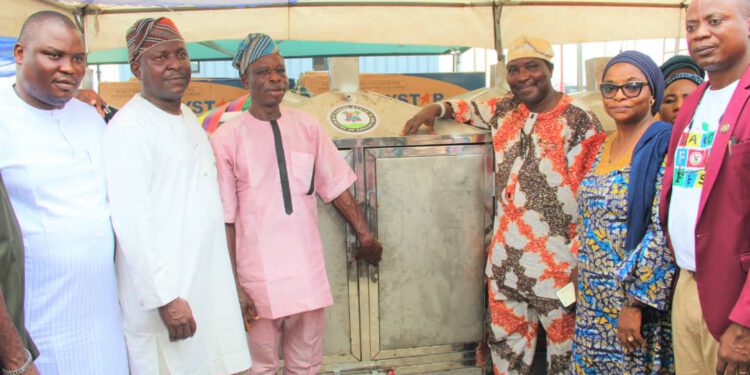The Lagos State Government has said that attainment of food security is a major policy thrust towards promoting the health and well-being of citizens and the achievement of Government’s THEMES Agenda, especially the 4th Pillar of Making Lagos a 21st Century Economy.
The state commissioner for Agriculture, Ms Bisola Olusanya stated this at the distribution of agricultural Inputs and production assets for fishing and farming clusters/communities across the twenty Local Government Areas of the State.
This initiative is in line with the Ministry’s five year Agricultural and Food System Roadmap to galvanize public, private, and donor agency efforts in the development of agriculture in the State’s economy.
Represented by the Special Adviser on Agriculture to the Governor, Mr Oluwarotimi Fashola, the Commissioner noted the Roadmap also provides solutions for the wholesomeness of food items, reduction in post-harvest losses, and improving linkages with industry with respect to backward integration as well as access fo financial services and markets.
According to her and I quote ” This is expected to scale food production from the present 20% of demand to 40% by the year, 2025. In this direction, the Ministry is implementing a number of programmes and projects fo facilitate the attainment of this vision, create jobs and promote livelihood sustenance for the Value Chain Actors.” End of quote.
She said that one of the challenges confronting agriculture in the State is an aging farmer and fishermen population while most youths who make up about 60% of the State’s population are not interested in the sector as a profession because of the nature of our System.
To correct the challenges, Olusanya said that the Ministry partnered with innovative companies to introduce technology in agriculture, especially the upstream sector, saying this is evidenced by the recently launched Tractor-on-the-Go project which is a tractor hailing service designed to facilitate easy and affordable access to mechanization services through applications installed in mobile phones and integrated agricultural projects implemented in the state secondary schools tagged Lagos Agric Scholars Programme to stimulate the interest of students in agriculture.
Other youth-centered efforts include the Lagos Agripreneurship Programme with the goal of training 15,000 youths with a passion for agriculture of which 3,000 has been successfully trained and plans are being put in place to train an additional 1,,200 youth this year. Aside from these, this Administration has trained 51,476 and empowered 25,691 women and youth in different agricultural value chains, such as the Cage & Pen Culture, Poultry, Rice Production, Snailery, Bee Keeping, Coconut Arts & Craft amongst others, using various government platforms.
The commissioner disclosed that 2022 Agricultural Value Chains Enterprise Activation and Farmers’ Support Programme is designed to provide agricultural inputs and production assets for over 120 fishing and farming clusters/communities across the twenty (20) Local Governments of the State. Over 20,000 fisherfolks and farmers will benefit from the programme while budgetary provision has been made to accommodate a larger number of Value Chain Actors in the 2023 edition of the programme.
Bisola Olusanya expressed profound appreciation to Governor Babajide Sanwo-Olu for his immense support to agricultural development in the State.
On his part, the Chairman of Eti Osa Local Government Area, Hon. Saheed Bankole said the council is in full support of the initiative he said will boost Agricultural Value Chain & food Processing Programme in the area.
The Chairman who was represented by Mr Sulaiman Adekanbi also commended the effort of the State Ministry of Agriculture for her unwavering commitment to agricultural sector and for recognizing the important of Supporting farmers in the Local Government and Lagos state as a whole.
He said the proramme is not just a game changer but a clear demonstration of government determination to improve the standard of living of the farming community with the establishment of fishing and farming clusters and food processing within strategic locations in the State.
















